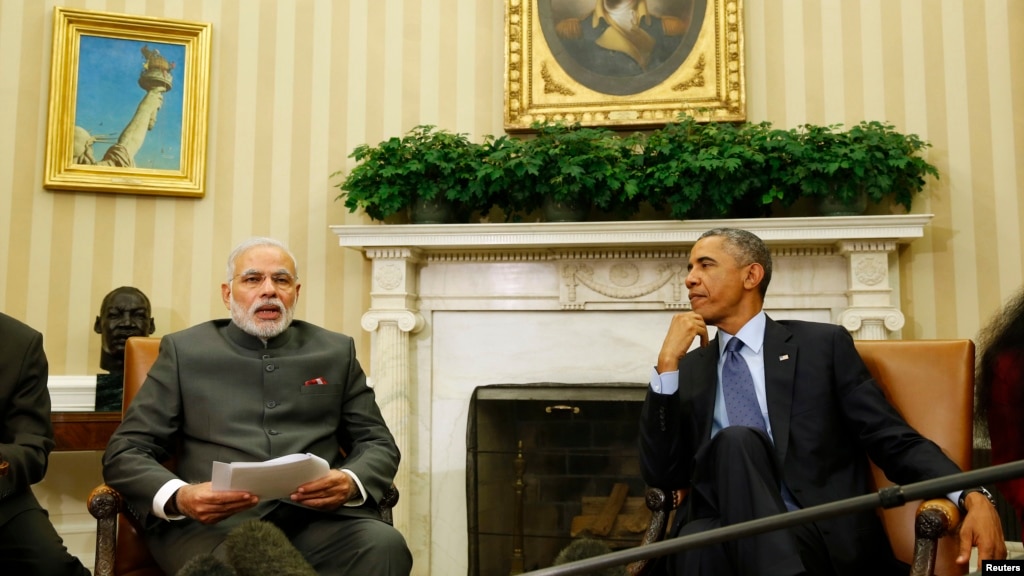On May 26, 2014 Narendra Modi was sworn as the 16th Prime Minister of India – «the largest democracy of the world».
Long before it happened experts had been saying that Modi’s coming to power would mean more independent foreign policy. His predecessor Manmohan Singh depended on the support of the Indian National Congress led by its General Secretary Sonya Gandhi, who regularly visits the United States for medical reasons. The foreign policy was fickle and subject to outside influence.

The new India’s strategy to large extent depends on the personality of Narendra Modi, who is known for his backbone and clear vision of India’s role as an independent actor in international politics. The focus on national interests has become tangible in the contemporary foreign policy based on the India First principle.
* * *
The Narendra Modi government puts China on the foreign policy priority list. For instance, Chinese investments are expected in Gujarat, the state led by Mr. Modi till 5/26. Even before the election Chinese diplomats linked the investments with the Modi’s personality, they believed him to be a strong leader able to position India as an independent «center of gravity» on the international arena.
Beijing welcomes the reluctance of new Indian Prime Minister to take part in the schemes aimed at «containment» of China in the Asia Pacific.
The Chinese leaders like the business style of Narendra Modi during his days as the Gujarat governor, they are interested in the Indian economy picking up the growth tempo over 8% as it had once before. They would also like to strengthen the economic ties between Delhi and Beijing.
China is also interested in using its dollar reserves for investments in transport infrastructure and creating industrial corridors in India (Japan and South Korea are seen as potential investors). The potential Chinese investments are estimated to be equal to $300 billion. According to Mr. Modi’ estimations, India needs approximately $1 trillion investments.
Besides, Indian and Chinese leaders have common interests in the Eurasian oil and gas transit system. Recently they have launched the construction of promising Iran-Pakistan-India pipeline. China wants to avoid the sea route going through the Malacca Strait; it is looking for shorter and safer alternatives. India also prefers more reliable land energy transits.
Experts believe that supposedly a new stage of mutual trust is reached no matter some differences on key issues remain. They suggest that Indian Prime Minister became more interested in receiving Russian natural gas through China.

Narendra Modi believes the idea of US-centered world has not come to fruition and the new world system requires closer coordination between India, China and Russia to stabilize the international situation. For instance, such coordination is possible in Afghanistan after ISAF winds the operation down. The three world actors are interested in maintaining the territorial integrity of the country. The surge of Islamic radicalism spreading beyond the Afghan borders would threaten western parts of China (the Xinjiang Uyghur Autonomous Region), western regions of India and Central Asia. Some Indian analysts emphasize that the effectiveness of coordination would be enhanced in case Iran joins the efforts applied by India, Russia and China.
China, India, Russia, Pakistan and Central Asia have an important role to play in the region where Iran and Saudi Arabia are key players. Delhi and Beijing have stable multilateral relationship with Tehran and Riyadh. Since the very start of Arab Spring Iran displays political tact and restraint towards the Shia communities of Arabian Peninsula and adjacent states.
India joining the Shanghai Organization of Cooperation along with Pakistan, Iran and Mongolia as full-fledged members would significantly change the balance of forces in Eurasia and globally.
Note: The Shanghai Organization of Cooperation is a regional group founded in 2001 by China, Russia, Kazakhstan, Kyrgyzstan, Tajikistan and Uzbekistan. At first the prime mission was the fight against terrorism and regional security. In parallel the activities spread on economy. The group’s clout has been growing. There are five states with the status of observers – Afghanistan, Iran, Mongolia, India and Pakistan. There more countries are dialogue partners. In 13 years the Shanghai Organization has grown to become a regional political center linking the leading economies of Eurasia.

Narendra Modi and Xi Jinping at the 2014 BRICS summit
In September Xi Jinping visited India to discuss the bilateral relations and would-be joint projects. It was the event of special importance. The both sides base their relationship on the notion of the world gravity center shifting to the East – the Asia – Pacific.
The talks between Xi Jinping and Narendra Modi were far from being plain sailing; the both vigorously defended their interests. The new Chinese initiative of «new silk road» makes India weigh the pros and cons of participation in the project. Delhi wants free access to the Chinese market for its commodities and technology (the India’s deficit of trade balance in 2007-2013 was equal to $169 billion). The parties strive to reach an agreement on the border delimitation but have so far made little progress on the way.
Conditionally India supported the idea of Bangladesh-India-China-Myanmar «economic corridor». It endorsed the implementation of the project based on peaceful and stable cooperation. During Xi's visit, India was granted 20 billion dollars of investment in five years.
Experts point out a number of factors to exert long-term influence on the India-China relationship.
First, Mr. Modi realizes that the Indian people are not ready for closer relations with China. The historic memory of 1962 is still fresh in memory to keep the majority of Indians away from rapid rapprochement with China. In China and India there are influential circles who believe that the relationship is too complex for quick solutions.
Note: In 1962 India and China faced each other in an armed clash as a result of border dispute caused by absence of clearly defined borders between British India and Tibet.
Second, India has no tradition of making abrupt foreign policy turns. It corresponds to such specific features of Indian civilization as continuity, reasonable caution and respect of the past. Incumbent Foreign Minister of India Sushma Swarage believes that the foreign policy (in general terms – author’s remark) does not fluctuate with the government changes. The foreign policy acquires new dimensions. More attention will be given to the Asia-Pacific region (Japan is the leading foreign investor in Indian economy, South Korea also invests a lot), but the final road map of Delhi’s policy in the East is not clear as yet.
Third, the Modi’s government sees a direct link between the modernization of Indian economy (comprehensive national strength) and foreign policy. The government sets the goal of building a «just society» – that is the basis of the Modi’s internal and external agenda.
Fourth, there is an unsettled border dispute that hinders the further development of the bilateral relations. The agreement on the delimitation is to be approved by Indian parliament and the Chinese Standing Committee of the National People’s Congress. Getting it through is not a bed of roses. Hard work is to be done for normalizing the bilateral relationship between the states-civilizations.
* * *

Visiting the United States in September Narendra Modi made remember that India is an important international player. Delhi believes that external ties, including military cooperation, should foster economic prosperity and create new working places.
The US sanctions imposed by the Clinton administration after India and Pakistan conducted nuclear tests in 1998 are still remembered. Delhi understands well that the US wants it to join the efforts aimed at China’s containment.
India does not feel it is obliged to be a party to creating a «security cordon» to cut China off.
Former Indian Foreign Secretary Kanwal Sibal, one of the most eminent foreign policy experts, says, «The US would want to build a network of relationship with countries threatened by China's rise as a card to have against China, but play it only if its own interests are directly threatened, but not to defend those of others. In other words, US would bring under its strategic umbrella key Asian countries and control their policies towards China in a way that serves US interests primarily. India would not like to slip into a relationship with the US which is a diluted version of Japan's relationship with it».
It’s not easy to implement the policy of «India’s interests go first» in the contemporary world. But the very existence of the state-civilization presupposes independent foreign policy. That’s why the triangle Delhi-Beijing-Washington is to be a balanced relationship.









